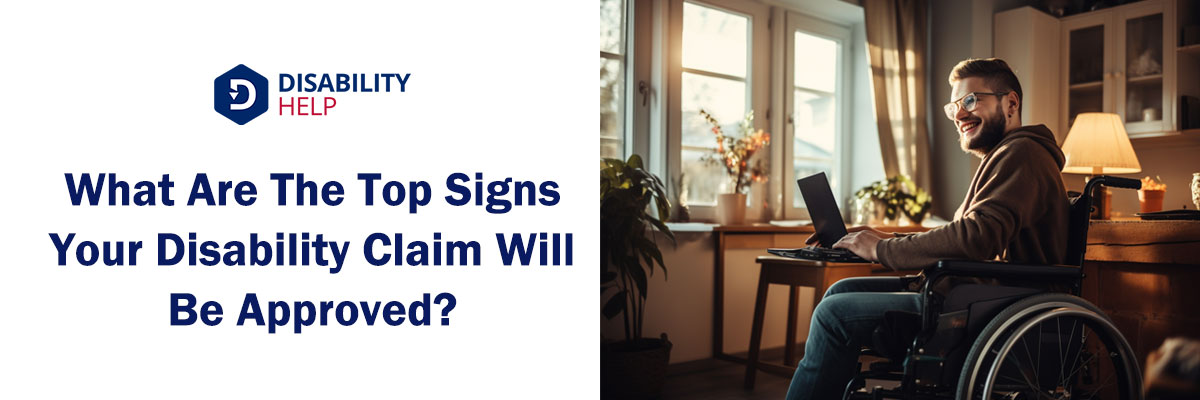Your application for a disability benefit might show some signs of approval if you provide adequate medical evidence to support your claim.
Fulfilling the technical requirements in your disability claim application can give you higher chances of approval.[1]
You have a good chance of being approved for benefits if your condition is under the SSA's listing of impairments on the SSA's Blue Book Listing.[2]
If you cannot participate in a substantial gainful activity (SGA), this is another indication that the SSA may approve your claim.[3]
Once you’ve filed for a Social Security disability claim, it will take some time for your application to be reviewed. However, there are reliable signs your claim will be approved if you strictly adhere to SSA’s requirements.
Applicants must present compelling evidence of disability to receive benefits from the Social Security Administration. To qualify, you must first provide sufficient medical documentation and proof that you cannot work

How To Get Your Disability Claim Approved
Your application for a disability benefit might show some signs of approval if you provide adequate medical evidence to support your claim. Before becoming eligible for disability benefitsFinancial assistance provided to individuals who are unable to work due to a disability, such as Soc..., you must prove that you can’t work for at least 12 months because of your condition. The following are a few signs your disability claim will be approved:
You Met Technical Non-Medical Requirements
Aside from medical documents, you must also fulfill technical requirements in your disability claim application.[1] The technical requirements you must meet include working, paying Social Security taxes, and earning enough work credits to qualify for disability insuranceA form of insurance that provides income to individuals who are unable to work due to a disability..
Work credits are earned by paying Social Security taxes while employed. An employee must earn up to four credits each year. Disability insurance benefits are available only if one has 40 work credits.
To determine if you have enough credits, ask yourself this question: “Have I worked five full-time years out of the last 10 while consistently contributing to Social Security?”
If the answer is yes, you are likely qualified. On the other hand, if you are working part-time, you must meet the income requirements for receiving SSDI benefits. If you have any further questions, you can always contact your local Social Security office.
Fast Facts
The wait time for processing disability claims can be lengthy. On average, it can take three to five months to receive a decision on an initial application.
You Provided Substantial Evidence For Severe Medical Condition
Medical evidence supporting your claim is a crucial requirement. Submitting medical records and proof of treatment is critical in getting your claim approved. To determine the severity of your disability, the Social Security Administration will refer to these records.
To strengthen your claim, make sure to keep the following documents in hand:
- Record of medical history
- Diagnostic reports
- X-rays and CT scans
- Description of treatments
- Prescription drug receipts
Ensure that you include any relevant medical records, including documents related to your conditions and impairments. You don't need to submit outdated and irrelevant information, such as an injury that healed 10 years ago.
In addition, finding a supportive doctor willing to fill out a work-related disability questionnaire or write a letter on your behalf can make a real difference to your case. Talking to your doctors early on about your disability claim is vital when considering applying for benefits.
You Checked The Social Security Blue Book Listing
The SSA uses an official guide that lists eligible medical conditions and diagnoses as the basis for awarding disability benefits to individuals. Depending on these factors, your benefits application might be approved or denied.
However, keep in mind that every person and every case is unique. Social Security doctors and medical professionals evaluate your claim and determine how your conditions impact you.
Studies frequently examine the impact of medical evidence on the outcome of disability claims. You have a good chance of being approved for benefits if you cannot work and earn an income due to your conditions. You can view the SSA's listing of impairments on the SSA's Blue Book Listing.[2]
You Showed Sufficient Evidence That You Cannot Work
When filing for SSDI benefits, you must prove that your disability hinders you from working for no less than 12 months. As a result, you can no longer earn any income.
The Social Security Administration will evaluate why you cannot return to your previous job before becoming disabled. They will also determine whether there is any other type of work you can do.
They will judge you based on your age, educational attainment, and skills. At the same time, they will examine your previous work history for at least 15 years and ask for bank statements or pay stubs to prove you have been jobless for at least 12 months.
You Cooperated With A Social Security Disability Attorney

Because Social Security has a very high disapproval rate for disability benefits, most applicants work with an attorney familiar with Social Security law to help them get approved.
Reviewing benefits claims may take an average of two years; that’s why it is beneficial to have an attorney assist you throughout the process. A lawyer will help you understand and navigate the process, which will make it less frustrating and overwhelming. Moreover, they will ensure that every step of the process is processed properly.
The Social Security Administration may ask for other forms and paperwork as you proceed with your claim. A reliable disability lawyer can explain things and ensure that necessary documents are submitted on time. In turn, this may guarantee that your claim is not denied because of technicalities, missing documents, or missed deadlines.
Studies show that, with an attorney’s help, your odds of getting approved for disability benefits are 3x higher because your claim is being tracked.
Fast Facts
Applicants who are represented by an attorney or a disability advocate have a higher chance of approval, especially during the appeals process.
You Are Earning Less Than The SGA
If you cannot participate in a substantial gainful activity (SGA), this is another indication that the SSA may approve your claim.[3] The SSA provides guidelines for determining an applicant's minimum monthly SGA based on their disability severity. Federal regulatory standards require a higher SGA for blind applicants, which is set at $2,260 for 2022, compared to $1,350 for non-blind applicants.
Frequently Asked Questions:
How can I tell if my disability claim is likely to be approved?
While there are no guarantees, a strong disability claim generally includes comprehensive medical documentation, a well-detailed work history, and a clear demonstration of how your condition prevents you from engaging in substantial gainful activity. If your claim meets the criteria outlined in the Social Security Administration's (SSA) Blue Book and you have provided adequate evidence, your claim is more likely to be approved.
Does receiving support from my healthcare providers improve my chances of approval?
Yes, receiving support from your healthcare providers can significantly improve your chances of approval. Detailed medical records, treatment history, and statements from your doctors regarding the severity of your condition and its impact on your ability to work can provide strong evidence to support your disability claim.
Can a well-prepared application improve my chances of a successful disability claim?
Absolutely, a well-prepared application can improve your chances of a successful disability claim. Ensuring that your application is accurate, complete, and includes all necessary documentation can help expedite the review process and avoid delays or denials due to missing or insufficient information. In some cases, working with a disability attorney or advocate can further enhance your claim's strength and increase the likelihood of approval.
Conclusion
It can be difficult and frustrating to apply for disability benefits, but knowing the facts and understanding how to get your application approved is a good place to start when preparing. Are you interested in learning more about the various programs that help people with disabilities? Read more of Disability Help’s resources today!
- “Exploring Basic Eligibility: "Non-Medical" Information.” Soar Works, 2016, https://soarworks.samhsa.gov/article/exploring-basic-eligibility-non-medical-information
- “Listing of Impairments - Adult Listings (Part A).” Social Security Administration, 2022, https://www.ssa.gov/disability/professionals/bluebook/AdultListings.htm
- “Substantial Gainful Activity.” Social Security Administration, 2022, https://www.ssa.gov/oact/cola/sga.html






